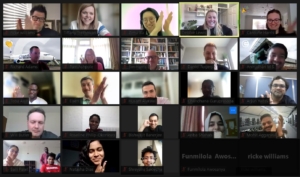NatWest Climate Hackathon 2022 –Winners experiences
22/06/2022

Daniel Rogers – ‘They say there is no “I” in “team”’
They say there is no I in team, but I feel there should always be a Bish, Ani, Nishant, and Mohit! Taking on the NatWest Climate Hackathon is an opportunity to work with people for the first time presenting a unique opportunity to put our experience together and create a concept that can tackle food poverty and urban sprawl across the globe. Keeping our discussion grounded in the question presented, an intense ideation process created a clear proposal for an immediate and long-term growth business model that can partner with the university and its world class schools of water, environment and agrifood. An already condensed time frame intensified by a daily exam schedule made every discussion count and supported an environment where robust challenges of ideas and collaboration was necessary to deliver our proposal. For us all, being open to this environment was important and was ultimately the key to our success. Individuals can have brilliant ideas, but a team of people with unique experiences and talents can create a brilliant solution.
Nishant Singh Hada – ‘Sustainability is in vogue’ OR ‘As close to doing a mini-MBA as it can get’
Sustainability is in vogue. Everyone talks about it, learns about it, and reads about it, but rarely an opportunity arrives to work out a solution and present it in front of industry experts. NatWest Hackathon was one such opportunity which we could not afford to miss.
After the initial briefing and exciting process of forming a team, we had a few ideas in mind for a solution, which could take us far in the competition. However, on the competition day the problem statement we got came as a surprise, it demanded a complete rethink and building the solution from scratch. This was by far the most challenging and fun part of the NatWest Hackathon.
Our biggest learning from the experience was to trust the process, trust the team, focus on the problem statement, and keep it simple. Giving it our all while juggling with exams, socialising events and balancing home life was as close to doing a mini-MBA as it can get. Sharing this roller coaster ride with my great team members was the most enjoyable part.
Climate change is a big problem, everyone talks about it, but the pictures of reality as shown to us by Prof. Jim Harris shook us up to see how grave the situation really is. We thank NatWest for taking this initiative involving students and encouraging them to be a part of problem-solvers rather than becoming armchair activists.
After building a business model, going deep into research, and pitching the business idea, the team and I were excited and confident about the idea. The experience gained by the NatWest Hackathon and finally winning a prize is a highlight of our academic journey. We are once again thankful to our professors and the NatWest team for conducting this event in such a fabulous way.
Anirudhan Mariswamy Subramani – ‘The journey to victory was a hands-on learning experience of strategizing and excelling in a challenging context.’
We registered for the NatWest Climate Hackathon at the most complicated time of the year. Two exams were in the pipeline and so was the most-awaited first MBA outing to Go Ape. However, the plan to participate in the NatWest competition was done at least a month in advance. Some of us were already a micro team initially scouting for team members even before orientation week. This got us all mentally prepared for the upcoming hardships and challenges. The key to our success was our time management and distribution of work. Early identification of each team members’ strength helped in delegating the right tasks to the right people. Most of our brainstorming took place just after our Project Management exam. We were all mindful of each other’s mental fatigue and focussed all our energies to maximize the value out of our brainstorming sessions. Our minds were also preoccupied with the anxiety to perform well in another quantitative exam paper which was scheduled the very next day. However, nothing could possibly come in the way of our team’s self-determination. All of us passed the two exams, enjoyed a fun day at Go-Ape, and finally we won the NatWest Climate Hackathon Competition. Overall, the journey to victory was a hands-on learning experience of strategizing and excelling in a challenging context.
Mohit Agarwal – ‘Which is the whole point of this competition’
Participating in the NatWest Climate Hackathon provided us with a unique opportunity to work with people from different backgrounds on an idea that will be useful for society and the environment. As mentioned by my teammates, it was a hectic time with a lot of deadlines, but our team was able to distribute the work effectively, and everyone acted as individual leaders for the assigned task. Everyone was ready to help each other out, and the brainstorming sessions generated a lot of great ideas.
It was so much fun to write a script for the video and do multiple retakes and iterations. As the technical lead, I used my technical background to design the logo and give an identity/image to the team.
Our team had the best chemistry where everything just came together. We accomplished the task in time while having great fun providing an excellent solution to the problem, which is the whole point of the competition.
Bishwajit Banerjee – ‘Ideas are a dime a dozen’
Ideas are a dime a dozen unless you have a solid team to execute them. I had a great time in this competition. We were first introduced to this event during our MBA orientation week. Since I am quite invested in the ideas regarding innovation in the Environmental, Social, and Governance (ESG) domain, it was a natural decision to take part in this event. I have worked and participated in discussions with everyone within this group in some prior instances, so settling into the team dynamics was smoother than anticipated. Although the timing of the event coincided with some of our difficult examinations and other events, having an active team where everyone understood their role and executed them to perfection, was a blessing.
Further, the organising team were fabulous with their programme management. Right from the beginning, every aspect of the brief and related concepts was clarified succinctly to all the teams. Prof Jim Harris elaborated on the concepts of ESG so that every team was on the same page. Special thanks to Debbie Lewis, Regional EcoSystem Manager at NatWest Business for being a patron of this event. Ricke Williams, Local Enterprise Manager at NatWest Business was helpful with his insights on how to create an elevator pitch. Dr Stephanie Hussels and Dr Oksana Koryak have always been great mentors. Finally, Gabriela Pearson, Tiffany Trethowan and Caroline Harris from the Bettany Centre team performed the execution to perfection.
From my interaction with the participants during the introduction ceremony, I realised that most of the participants had some business solutions in the ESG spectrum. All these brilliant ideas were meritorious, and I felt it would have been very difficult to judge them against each other without a common ground. The twist and the biggest challenge came in the form of the theme “ESG in Education”.
Fortunately, we had a team with diverse experience and specialisation. We came up with an idea which was relevant to the broader concept and the requisite theme. We used our project management skills, broke down the tasks and allocated them to everyone according to their strengths and time commitment. We had periodic discussions to make sure everyone was on the same page and help each other who required support. Finally, the sum of the parts was transformed into a whole and submitted to the industry judging panel. We understood the challenges posed by other teams, who were specialists in their domain, but we too were confident about our vision and the product. In the end, the execution was performed like clockwork and despite all our other commitments, we came out on top, thanks to a great team!

Congratulations to the winner’s Team MBA and runners-up Team Leap of this year’s NatWest Climate Hackathon!
For further details on the Bettany Centre please visit our website.
Find out more about the NatWest Business Builder here, a proprietary entrepreneurial training programme.
Categories & Tags:
Leave a comment on this post:
You might also like…
Introducing… Bloomberg Trade Flows
Are you interested in world trade flows? Would it be useful to know which nations are your country's major trading partners? If so, the Bloomberg terminal has a rather nifty function where you can view ...
Cranfield alumni voyage to the International Space Station
Seeing our alumni reach the International Space Station (ISS) has a ripple effect that extends far beyond the space sector. For school students questioning whether science is “for them”, for undergraduates weighing their next ...
From classroom to cockpit: What’s next after Cranfield
The Air Transport Management MSc isn’t just about learning theory — it’s about preparing for a career in the aviation industry. Adit shares his dream job, insights from classmates, and advice for prospective students. ...
Setting up a shared group folder in a reference manager
Many of our students are now busy working on their group projects. One easy way to share references amongst a group is to set up group folders in a reference manager like Mendeley or Zotero. ...
Company codes – CUSIP, SEDOL, ISIN…. What do they mean and how can you use them in our Library resources?
As you use our many finance resources, you will probably notice unique company identifiers which may be codes or symbols. It is worth spending some time getting to know what these are and which resources ...
Supporting careers in defence through specialist education
As a materials engineer by background, I have always been drawn to fields where technical expertise directly shapes real‑world outcomes. Few sectors exemplify this better than defence. Engineering careers in defence sit at the ...







Comments are closed.